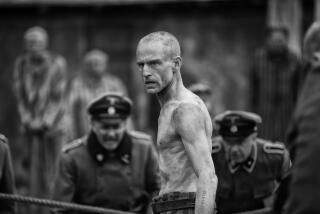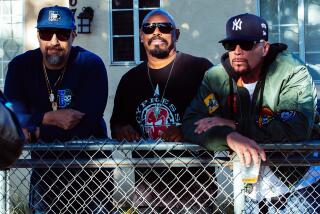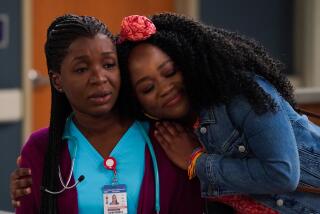Gorbachev and Yeltsin a TV Coup for ABC
- Share via
No doubt about it: “The Mikhail and Boris Show” could play the Palace.
Forget New Haven. No road tryout needed. Book them straight onto Broadway. Give them a weekly TV series. With Peter Jennings as host, of course.
Talk about one world. Thursday night’s ABC spectacular with Soviet President Mikhail S. Gorbachev and Russian Federation President Boris N. Yeltsin answering questions from audiences in nine U.S. cities was a show-stopper in every regard, a TV broadcast for the ages.
If the two leaders had gotten up from their chairs in the grandeur of the Kremlin’s St. George’s Hall and started hoofing the old soft shoe, it might not have been any more amazing than what we were already seeing.
Loose and comfortable on TV, occasionally even amusing in exchanges with Jennings and their U.S. interrogators, they answered, with frequently eye-opening frankness, questions on the minds of many Americans.
What about political dissidents? What about anti-Semitism in the Soviet Union? How do you guys get along? Look, Yeltsin, are you using Gorbachev as a pawn until you can dump him? Are you unloading Cuba? Is it safe for defectors to return? What are your religious beliefs? Who controls the nuclear weapons? Isn’t it about time women were treated as equals over there? And hasn’t communism been a failure?
The 1 1/4-hour interview moved so swiftly under the deft guidance of Jennings and producer Richard Kaplan that you had to remind yourself at times that three quarters of a century of Soviet Communist rule now was officially dead and that this was, in a sense, an international TV wake.
Only hours before, the Soviet Parliament had voted to do away with Lenin’s centralized state and transfer most power to the republics.
And although Gorbachev and Yeltsin had given previous major interviews this week, most notably to CNN, here they were, together at least for the moment, outlining their hopes for the future to the Soviet Union’s onetime Cold War foe and now its new friend, the United States.
Many viewers must have been sitting there thinking that they never in their lives thought they would see such a sight.
VCRs around the nation must have been going full steam as viewers taped the interview that they could show to their children and grandchildren--a moment in history that they were lucky to see way back in 1991.
This was a classic case of a TV network and its interview subjects using each other masterfully. ABC, for its part, solidified its reputation as the journalistic leader of the Big Three networks. Jennings enhanced his position as the Big Three’s top anchor.
And Gorbachev and Yeltsin were selling themselves on a variety of fronts--for, as Jennings noted, the broadcast was not only being seen in America but also in the Soviet Union and in Central and Eastern Europe because of the great interest in it.
If CNN is still TV’s foremost news organization--and it is--ABC nonetheless delivered on its town meeting-style broadcast, which was postponed from Monday because Gorbachev and Yeltsin wanted to wait until the conclusion of the Congress of People’s Deputies, which was debating the future of the Soviet state.
In a sense, the postponement, though frustrating to ABC and viewers, worked to the network’s advantage, for the timing of Thursday’s broadcast--following Gorbachev’s forceful triumph in Parliament--was perfect, with a heady atmosphere of victory pervading the interview.
Nonetheless, Gorbachev took the time to offer his apologies for the postponement.
Jennings has rarely been better. Standing on a small circular stage in New York, surrounded by an audience, watching the Q&A; participants on a huge TV monitor alongside a large design of an American flag, he was the perfect combination of friendly host, tough anchor and provocateur , filling in with sharp, clarifying questions when he felt there was a gap in the exchanges.
There weren’t many. First, the technical marvel of international TV was working smoothly--as ABC’s switches from Moscow to the nine cities, including Los Angeles, went off without a hitch and the interpreters sped things along efficiently.
Second, ABC--which has always exceeded at big-event programming, from the Olympics to the Iran hostage crisis to such miniseries as “Roots” and “The Winds of War”--looked like its old self as the Thursday broadcast gathered steam.
In Los Angeles, an audience of about 40, invited from groups and individuals who had special interest in the Soviet situation--and good questions to boot--participated from a sound stage at the Hollywood lot of ABC’s local station, KABC Channel 7.
As in all the cities--the others were New York, Chicago, San Francisco, Miami, Atlanta, Detroit, Philadelphia and Houston--questions were submitted by local ABC field producers to Kaplan, who made the choices.
If “The Mikhail and Boris Show” was a triumph, it also reminded us, ironically, of the otherwise dreadful lack of extended, prime-time specials by all the networks, including ABC, in covering the collapse of communism and the dissolution of the Soviet empire--one of the great stories in the history of the world.
But here was ABC showing us on Thursday just what network TV could do if it set its mind to it. And it was quite a sight. Yeltsin, for instance. In the interview, he was a far more commanding TV figure than Gorbachev, never mincing words and giving short, pointed answers that would please any TV consultant.
Gorbachev was often long-winded in his ill-advised attempts to give overly diplomatic answers--never a good television technique. Yet just seeing his renewed spirit--however temporary--after the coup d’etat that briefly unseated him only several weeks ago made for dramatic TV viewing.
The unflappable Jennings set a light-handed tone right off the bat when a photographer trying to snap some shots of Gorbachev blocked ABC’s camera. “Perhaps, Mr. Gorbachev, you’d give that photographer a kick,” said Jennings, drawing appreciative laughs from his audience.
Then came some memorable moments. Yeltsin on Gorbachev: “Our relationship has not been an easy one.” Yeltsin on Cuba: “Gradually, the (Soviet) troops must be moved out.” Gorbachev and Yeltsin looking at each other and laughing when a Soviet defector asked if it was safe to return. “There’s no more danger,” Yeltsin said.
Gorbachev: “Anti-Semitism is lessening.” Yeltsin on communism: A “tragedy that it was allowed to happen on our soil.”
All in all, pure electricity on TV. A night to remember.
More to Read
The complete guide to home viewing
Get Screen Gab for everything about the TV shows and streaming movies everyone’s talking about.
You may occasionally receive promotional content from the Los Angeles Times.






